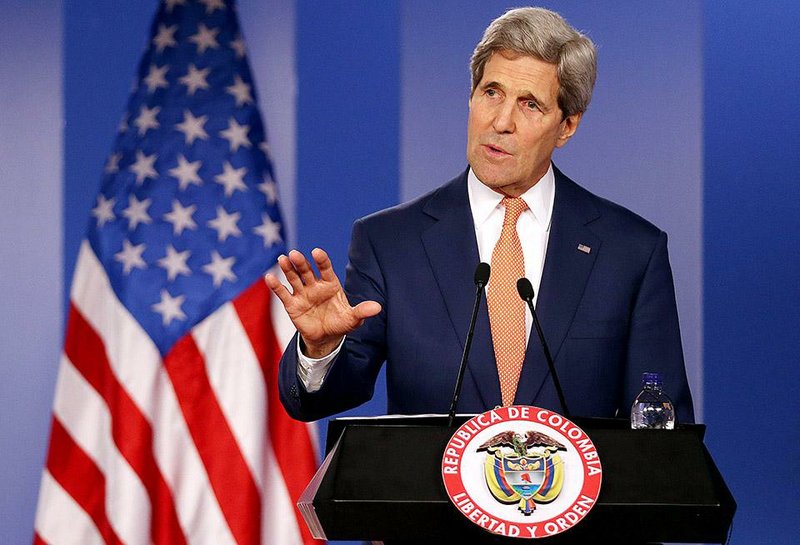BOGOTA, Colombia -- The United States is looking to avert a brewing clash at the U.N. Security Council as it grapples with proposals to recognize Palestine as a state -- over Israel's objections.
A series of meetings set for U.S. Secretary of State John Kerry next week in Europe aims to unite countries that are pushing conflicting proposals for a two-state solution to generations of war and tensions between Israel and Palestinians. Several nations, including Jordan and France, have proposed Security Council resolutions that they would like to see adopted before the end of the year.
"We're trying to figure out a way to help defuse the tensions and reduce the potential for more conflict," Kerry told reporters Friday in Bogota, where he met with Colombian President Juan Manuel Santos. "We're exploring various possibilities to that end.
"There are a lot of different folks pushing in different directions out there, and the question is: 'Can we all pull in the same direction?'"
Israel has long objected to U.N. endorsement of a Palestinian state without first sealing a peace treaty between the two sides. Kerry sought to broker a peace deal between Israel and Palestinian authorities but fell short in April after nearly nine months of tense negotiations.
The push for Security Council action follows the failure of those talks, in addition to this summer's 50-day war between Israel and Hamas, the Palestinian faction that controls the Gaza Strip, and the recent upsurge in violence sparked by disputes over Jerusalem's hilltop complex that is revered by both Muslims and Jews.
U.S. officials say they aren't opposed to a new Security Council resolution but that none of the drafts that have been offered so far are acceptable.
Kerry will meet Israeli Prime Minister Benjamin Netanyahu in Rome on Monday, and later with European foreign ministers. He also spoke Friday with Russian Foreign Minister Sergey Lavrov in what a U.S. official described as a conversation focused on the Middle East, including recent developments in Israel, the West Bank, Jerusalem and the region, and the potential U.N. action.
Meanwhile, the top United Nations human-rights official said Israel must investigate and curb the rising injuries and deaths occurring during Palestinian protests.
Zeid Raad al-Hussein, the U.N. high commissioner for human rights, said Friday that the problem was highlighted by the death Wednesday of a senior Palestinian official during a confrontation with Israeli troops.
Palestinians blame Israel for the sudden death of Ziad Abu Ain. Israeli pathologists say the 55-year-old died of a heart attack.
Zeid said the death, along with the serious wounding of a 14-year-old Palestinian boy reportedly shot by Israeli security forces, should be investigated.
According to Zeid's office, at least 50 Palestinians have died in altercations involving Israeli security forces in the West Bank and east Jerusalem, almost twice as many as the previous year.
Also Friday, a Palestinian attacker posing as a hitchhiker threw acid at an Israeli family in the West Bank before he was shot by a passer-by and arrested, the Israeli military said.
The Israeli family -- a Jewish man, his wife and four young girls -- were sitting inside a car when the Palestinian man hurled acid at the woman and the girls in the Gush Etzion settlement complex south of Jerusalem, the military said.
The army said the Palestinian also tried to attack the father of the family with a screwdriver and then started to run away, but a civilian passer-by shot him in the leg. Israeli police arrested the man and evacuated him to hospital for treatment.
The Israeli family members suffered light injuries, the police said.
Acid attacks are rare in Israel and the Palestinian territories. In 2001, a Palestinian girl seriously injured a young Israeli woman when she entered a Jerusalem shoe shop and threw acid at a salesman.
Earlier Friday, a Palestinian rammed his car into a bus stop where Israeli soldiers were waiting in the West Bank. The troops were not hurt, the military said. The driver was slightly hurt and taken in for questioning to determine whether it was an accident or an intentional assault. Several hours later, the military issued a statement saying it concluded the incident was an accident.
Information for this article was contributed by Ian Deitch and staff members of The Associated Press.
A Section on 12/13/2014

